“A rising tide floats many boats”: Authenticity and collaboration are key for Somerset orchard
12th April 2024
Creating ciders with 100% fruit juice rather than imported concentrates is a point of principle for Dowding’s Apple Juice & Cider, based in Somerset. Deputy editor Sarah Kidby spoke to farm owner Oliver Dowding, on the challenges facing smaller producers, the importance of working with other local businesses, and how the organic farm uses innovative approaches to tackle pest and disease problems.
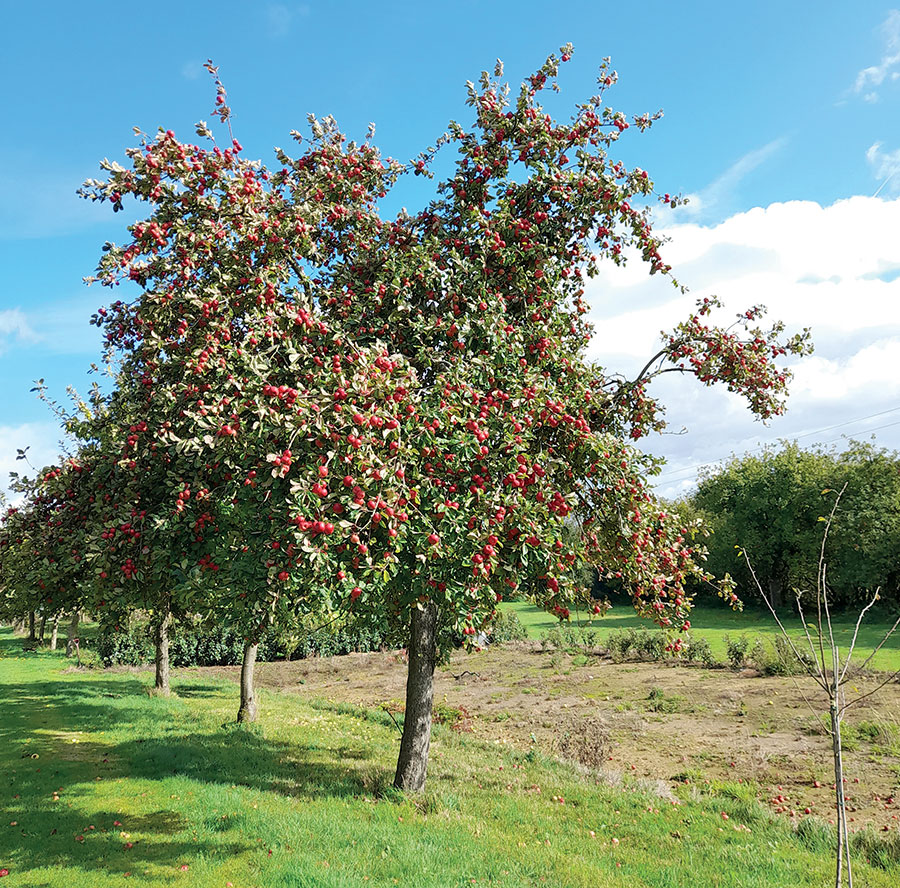
Oliver Dowding has farmed in Shepton Montague, Somerset, for his entire working life, and worked alongside his father until his death in 1988. Over the years, the farm has had a herd of dairy cows, kept beef cattle, and produced cereals and vegetables. But after the herd was sold in 2005, Oliver’s focus shifted to the apple orchards that were planted in 1995.
Having converted the whole farm to organic management and standards in 1990, part of the land was entered into a predecessor of the Countryside Stewardship Scheme, which involved planting an orchard where there had previously been one.
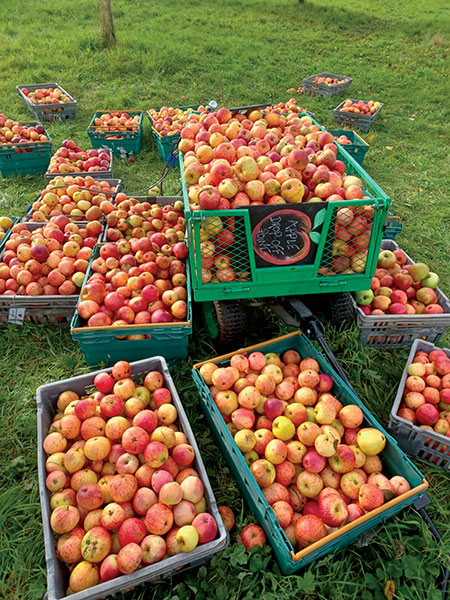
Five very traditional Somerset varieties of cider apple were chosen – Yarlington Mill (which is about four miles from the orchard), Harry Masters Jersey, Sweet Coppin, Dabinett, and Browns. Oliver comments: “These give a great blend of flavours and attributes, from low to high tannin, sweet to acid, bittersweet to bittersharp. To this mix we add some other varieties we are offered, plus some cooking apples, of which there are a plentiful supply here.”
Today the farm’s apples are used to produce cider and juice, as well as apple cider vinegar, which are sold through a variety of local outlets such as cafés, pubs and shops, as well as markets and local events. A rising number of people have also begun buying direct. The farm’s ciders are named Tower Brue after King Alfred’s Tower, which is visible from the orchards, and the tributary of the River Brue which runs through the orchard into the local town of Bruton (Brue-town).
Dowding’s currently makes far more juice than cider, so most of its varieties are dessert apples, but it also sources local apples that would otherwise go to waste.
Three years ago they also planted 100 Kingston Black trees – an increasingly rare Somerset apple variety first grown in the parish of Kingston-St-Mary near Taunton. Although still young, it is hoped the trees will produce good yields.
A full range of natural flavours
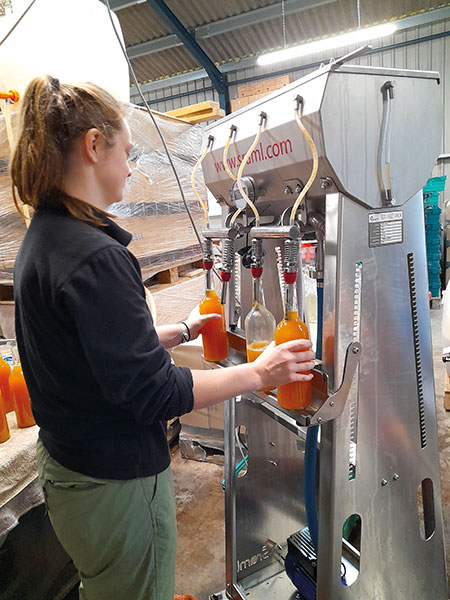
Making ciders with 100% fruit juice is something Dowding’s refuses to compromise on. “We will only ever create cider with 100% juice content and mature it for at least nine months,” Oliver explains. “We won’t dupe the consumer by watering down our cider, even if legally allowed. We don’t create a speedily made ‘concentrate’ to allow storage and then water it down.”
However, he adds: “Making a full juice cider does make it harder to compete; the multiple retailers like watered-down cider as they can screw the prices lower. That in turn sets a false price benchmark in the market and the consumer’s price-conscious eyes.
“With 100% juice cider you will get the full range of natural flavours, each being unique for every cider maker and probably different every year. We don’t manipulate our flavours with a large range of ‘additives’ etc. This allows us to deliver sound and thoroughly appreciated products to our discerning customers, be that via local stockists or people coming to buy direct from us.”
Impact of a late harvest
In years such as 2023, when poor sunshine levels in July and August resulted in low sugar and a badly delayed harvest, many larger scale producers import ‘concentrate’ from other countries where there has been more sun, and thus, sweeter apples, putting further pressure on smaller producers, Oliver explains. Labelling rules in the UK only require businesses to say where the drink was made, not where the apples originated.
Ideally, harvest starts in early September at Dowding’s, but is dictated by the season. “We have to wait until the sugar levels are good enough, as we don’t want apple juice that isn’t sweet. Last year’s lack of sunshine through the summer proved particularly challenging, although a four-hour frost in late May 2021 was worse, with a whole orchard’s annual output reduced to zero in a few hours,” explains Oliver.
Oliver adds: “Small producers struggle to compete on price with the larger producers, but it’s even harder when battling imports and the natural levels of sweetness.”
The knock-on impact of this is that many local orchards are left with unwanted fruit – and the orchard owners are despondent. As well as using the apples from its own certified organic orchards, Dowdings makes use of these unwanted apples which otherwise wouldn’t be harvested, which allows schools and community projects to get involved. It also prevents wasting of apples from the many traditional and varied orchards in Somerset – often referred to as ‘apple and cider country’.
Dowding’s is now receiving fruit from many sources, including the National Trust at Montacute and Barrington Court, who used to process their own fruit until the Covid-19 pandemic. “Sadly, it’s impossible to use everything we are offered, either because they are too far away, the wrong varieties or that we simply have enough,” Oliver says.
The delayed harvest also means Dowding’s has had to be much more selective about what it harvests and when, which in turn makes for frustration with those whom it has offered work. This is particularly true of the ‘WWOOFers’ (World Wide Opportunities on Organic Farms) who arrange to be here for harvest and find themselves deployed to other tasks, not in the orchards.
People versus machines
All apples are hand-picked and thus graded in the field, and whilst this presents a significant cost to the business, it’s not something Oliver wants to compromise on, and the orchards don’t lend themselves to mechanical harvesting.
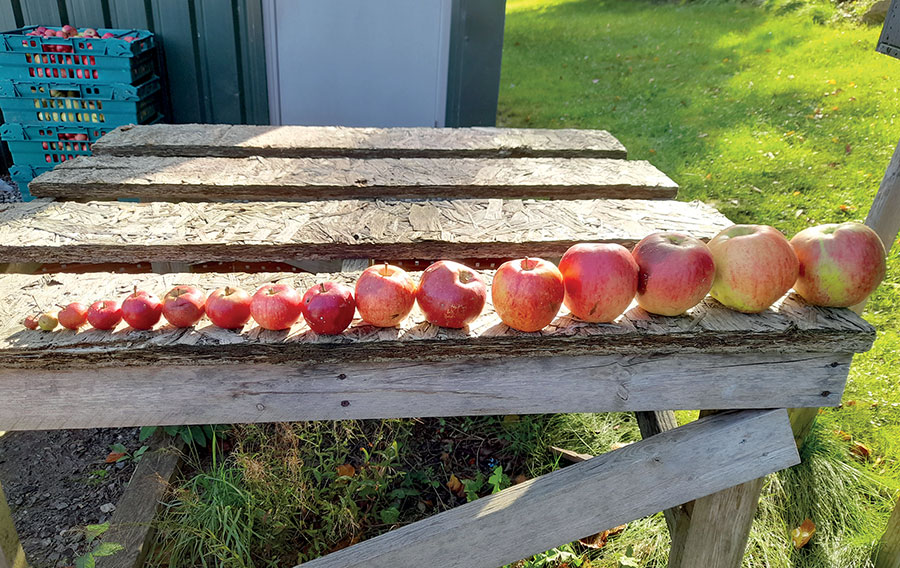
Oliver and his partner Jane are the only permanent staff. Being a small business, they have always relied on employing a small number of local people during harvest. However, now that it is registered with WWOOF it has a lot of willing workers coming from all over the world to volunteer. “Being part of the WWOOF community has exceeded our expectations. We enjoy providing our WWOOFers with free board and lodging and undertaking whatever tasks we can to ensure they enjoy their time with us.
Minimal field machinery is required on the farm beyond a Ferris 4ft topper. Where mechanical help is occasionally needed they use local contractors, including Oliver’s nephew Jack who is based in the village. Some work is also done by a local farmer in exchange for receiving lots of apple pomace at harvest for his cows. Manual labour allows Dowding’s to grade and sort the apples before they enter the crusher, which is good for quality control and also removes the need for some equipment and processes.
Oliver added: “It is very hard to make a financial comparison between using people versus machinery, particularly on a small scale. We hugely value working with people.”
An inventive approach to pests
Voles have been the most significant pest for the orchards which are still being established. “In establishing young trees, voles are incredibly destructive and cause major costs in replacing young trees that are damaged by them. As organic producers we have limited options for control,” Oliver explains, which is why they began working with Pitcombe Rock Falconry, in the next village.
“Their founder, Alan Wells, spent seven mornings, afternoons and evenings here watching and noting what prey existed and what birds of prey could be supported. As he is a paramedic he would also drop in in the evenings on his way to a night shift. He then provided us with a comprehensive report documenting the farm wildlife, including existing owls, some of which were looking for a mate. This gave him the necessary information required to confidently install four owl boxes to suit three different owl species.
The farm also now works harder to keep the grass shorter to reduce the appeal to voles and helps expose them to the owls.
Voles aside, the farm suffers the usual range of pest and disease issues affecting apple growers and again, treatment options are very limited by its organic status. After over 30 years of organic management, the farm has some very healthy soils, albeit they are not deep, Oliver says. There is limestone brash on one side of the stream dividing the orchards with a loam over clay on the other.
Creative plans
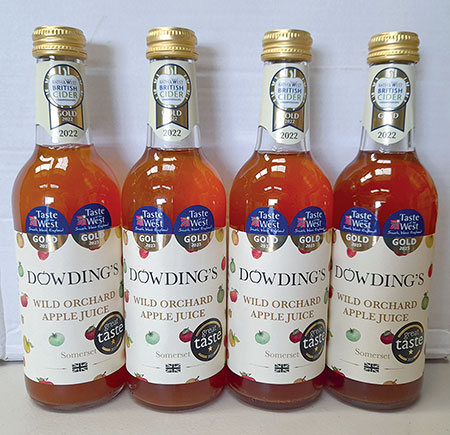
The farm’s cider production has always been restricted by the 7,000-litre duty-free allowance, so its focus is increasing sales to local outlets such as cafés, farm shops, pubs etc. Where they will increase production is with apple juices, particularly single or mixed varieties. The farm currently only produces one single variety apple juice, the Kingston Black, and Dowding’s has recently made contact with a few people in Kingston-St-Mary who have offered their Kingston Black apples. The farm enjoys connecting and collaborating with other local producers – believing that “a rising tide floats many boats”.
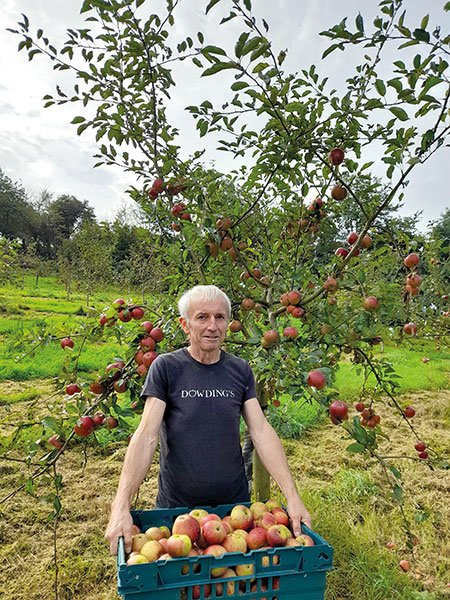
Grower profile
- Farm owner: Oliver Dowding
- Location: Shepton Montague, Somerset
- Total farm size: 240ha
- Size of orchards: 6ha
- Approx number of trees: 1,400
- Varieties grown: c. 35 dessert varieties, six culinary varieties, seven cider varieties
- Soil type: Limestone brash and medium loam – all quite shallow
Read more grower profiles
Read more fruit news
